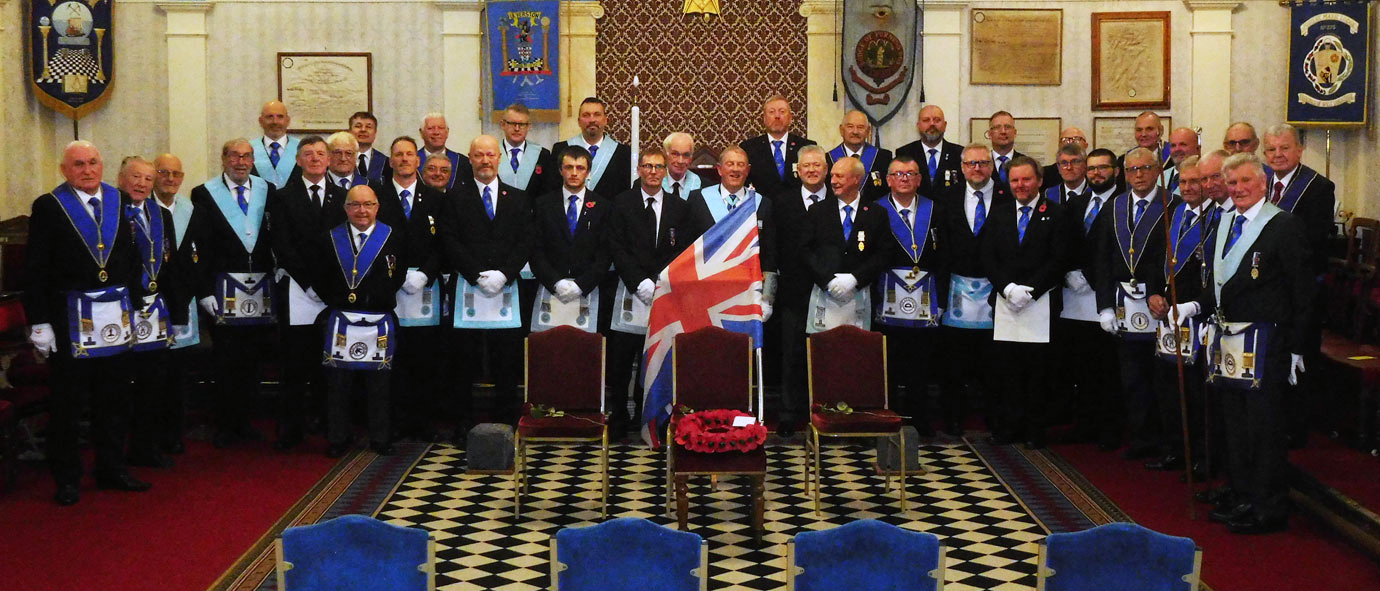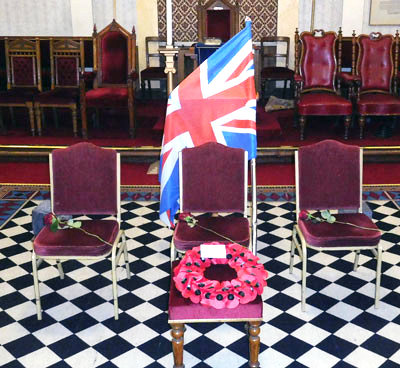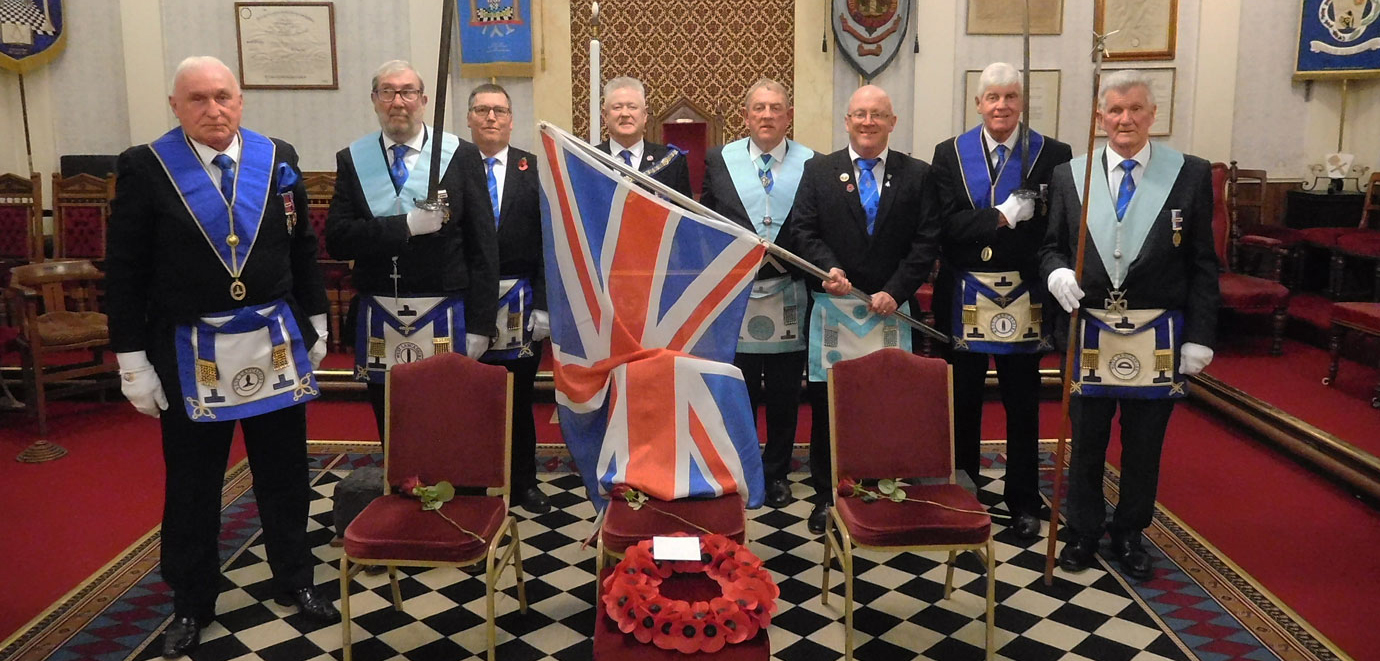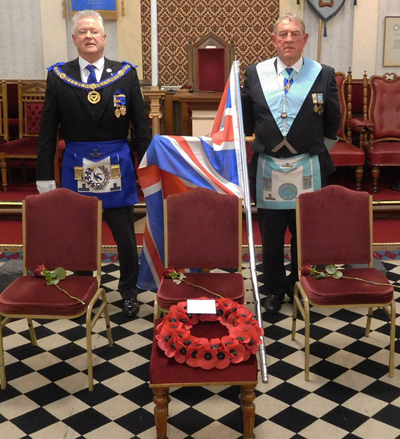Brethren of Lodge of Furness No 995 presented a ceremony of remembrance entitled ‘In Flanders fields they died that we might live’ at Ulverston Masonic Hall, Kings Road, Ulverston to over 50 brethren, including Assistant Provincial Grand Master Peter Schofield, who took a very active role, alongside WM Tom Irving, chaplain Howard Whittaker, director of ceremonies Tony Nevinson, IPM Keith Lancaster, senior warden Mark Hornby, junior warden Gary Greave and Stuart Hare.

To set the scene, the lodge is set out with three chairs facing the WM’s pedestal with four further chairs placed in the centre of the lodge for the seating of the presentation party. Before the lodge was opened, Tom Irvine offered the gavel of the lodge to Peter Schofield, who declined to accept it on this occasion.
The chaplain read a short prayer, then Richard Wilcock read “In Flanders Fields”. Tony Nevinson requested permission to retire and re-entered the lodge with the presentation party, consisting of Russ Greenhow, Dave Helm, Chris Angel and Bert Chambers, each bearing a drawn sword, a wreath of poppies and a Union Flag. Assistant Director of Ceremonies, Chris Angel, placed the wreath in front of WM’s podium whilst the flag was lowered and the swords held at the level before retiring to their respective chairs.
Keith Lancaster introduced the presentation thus: “From 1914 to 1918, during the First World War, Flanders was a major theatre of battle on the Western Front. 1,000,000 soldiers from more than 50 different countries were wounded, missing, or killed in action here. Entire cities and villages were destroyed, their population scattered across Europe and beyond. The poem, ‘In Flanders Fields’ paints a vivid picture of the poppies that bloomed amid the graves of fallen soldiers in Flanders, a region in Belgium heavily affected by the war. The poem speaks to the duty of the living, to carry on the fight and honour the sacrifice of those who gave their lives.” Tom Irving once again offered the gavel of the lodge to Assistant Provincial Grand Master Peter Schofield, and this time he accepted.
Peter took the chair and gave a vivid and moving tribute to three brethren of the Lodge of Furness. He alluded to the three empty chairs before him on the floor. “These chairs although empty at this time proudly represent three members of this lodge, The Lodge of Furness, who bravely sacrificed their lives during World War One. They are as follows: Major Thomas William Aston Bagley, born 14 November 1865, died, 14 November 1915. Thomas was proposed into Freemasonry, in the Lodge of Furness, on 2 November 1899. He was initiated on 5 December 1899, passed on 6 March 1900, then raised on 1 May 1900. He was also a joining member of Arthur John Brogden Lodge No 1715 at Grange, West Lancashire Lodge No 3088 in London, Abbey Lodge No 1184 in Sussex, Furness Chapter No 995 in Ulverston, where he was exalted in 1904.

In January 1882 Thomas enlisted into the Royal Marines as a schoolmaster. He went on to see service in Egypt during 1886 and 1887, during which he was awarded the Bronze Star. He came back to England where in 1889 he became married to his wife Elizabeth in London, before once again being posted overseas. His service took him to Burma in the Far East where he was awarded the, ‘Indian Medal’ with the ‘Burma Clasp’. Wounded in action with the Naval Brigade in Upper Burma on 25 February 1890 he was invalided out of the Services. Thomas returned to England before emigrating to South Africa, but due to the climate failing to agree with him he returned home obtaining employment in the ship yards at Chatham in Kent. He developed a great interest in politics and later became the Agent to the Conservative MP for Devizes in Wiltshire, Sir E A Goulding Bart, who would later become the 1st Baron Wargrave. In 1896 Thomas moved to Ulverston as Agent for Richard Cavendish, later to become Lord Cavendish. This employment giving an explanation as to him moving to the Furness area where he resided at Morecambe View and eventually joining this Lodge.
At this time Thomas joined the Territorial Force in the Kings Own Royal Lancashire Regiment and helped to organise the Territorial Companies for the War in South Africa. Thomas then moved to Rye in Sussex and on 5 August 1914 reported back at Chatham for War Service. Unfortunately, he was deemed medically unfit at 49 years of age, but not to be perturbed he gained a Commission with the Supply Department of the Army Service Corps. He was gazetted as a Captain and on 20 October 1914 he went with the British Expeditionary Force to France five days later. On 26 March 1915 he was promoted to the rank of Major, when he then went with the Mediterranean Expeditionary Force to Salonica in Greece. It was here whilst on active service that he caught dysentery and pneumonia and died on 14 October 1915. He died on the hospital ship Carisbrook Castle on what was his 50th birthday. He was posthumously mentioned in despatches by Field Marshall Sir John French, in the London Gazette, on 1 January 1916, for gallantry and distinguished conduct in the field. Thomas was awarded the 1914 Star British War Medal with an Oak Leaf Clasp attached to the Ribbon. The headstone on his grave in Greece bears the epitaph: ‘Though Lost To Sight, To Memory Dear’.”
Peter Schofield left the master’s chair and placed a single red rose on the left-hand chair in front of him, bowing respectfully and returning to the master’s chair. He continued: “Captain Charles Richardson Hird, born 1876, died 2 December 1917. Charles was accepted into Freemasonry in the Lodge of Furness on 19 March 1912. He was initiated on 6 August 1912, passed on 7 April 1914 and raised on 2 June 1914.

Charles was born in Barrow-in-Furness in 1897 and married Dora Annie Threlfall in 1902 in the Parish of Ulverston. Their address whilst in Ulverston was ‘Belmont’. Charles devoted his life to the sea and in March of 1899 he obtained his Seaman 2nd Mate Certificate. His 1st Mate Certificate in 1899, and his Master Certificate in 1902. In wartime, Britain depended heavily on cargo ships, not only to import food and raw materials to our shores but to assist the war effort. The transportation of the soldiers, their equipment and all supplies required to be delivered to wherever in the world to support our troops. The title ‘Merchant Navy’ was granted by King George V after the First World War to recognise the immense contribution made by merchant sailors. From the start of that war in 1914, Germany pursued a highly effective naval and U boat campaign against our merchant shipping in an effort to bring Britain to her knees. Charles Richardson Hird was one of those heroes, who regularly risked his life together with others dicing with death by playing cat and mouse to avoid German intervention. Charles was captain of the Steamship ‘Moorlands’ when on 2 December 1917, he died at the Government Hospital Durban, Natal, South Africa of ‘Brights Disease’ (kidney disease).”
Peter Schofield left the master’s chair, placing a single red rose on the centre chair in front of him with great solemnity before returning to the master’s chair. He continued, “Captain Hans Robert Sparenborge, born on 2 November 1876, died on 26 August 1914. Hans was accepted into Freemasonry in the Lodge of Furness, on 4 of June 1912. He was initiated on 3 September 1912, passed on 1 October 1912 and raised on 5 November 1912. A poignant note to remember is that on the evening it was exactly 112 years to the day that Hans was raised to the 3rd degree in the lodge.

Hans was born in Calcutta in India, the eldest child of Johan Sparenborg a German born merchant who later became a naturalised British Citizen. By the time Hans was 10 years old, the family home was in South London, he being educated at Dulwich College and later Calus College, Cambridge. He became a specialist in modern languages and on leaving education commenced work with his father in the family business. In 1900 he joined the British Army and on the recommendation of his Cambridge Vice Chancellor, he immediately received a commission with the Royal Lancashire Regiment. In the 1911 census it was recorded that Captain Hans Robert Sparenborg was living with his family at Ringwood, Kilner Park, Ulverston. It is thought that his role as an officer with the Ulverston based territorial arm of the 4th Battalion of the Lancaster Regiment precipitated his move with his family to Ulverston.
Thomas now a Lieutenant was deployed with his regiment to the West African Frontier Force in Nigeria. He was promoted to Captain whilst also being made Adjutant of the 4th Territorial Battalion of his Regiment. When war broke out in August 1914, Hans was part of the first British Expeditionary Force sent to the continent. Having served throughout the retreat from Mons, he was killed by machine gun fire on 26 August 1914 near La Cateau in Northern France. At first, he was reported as missing in action and it was only confirmed that he had been killed in April the following year. Interestingly the local newspaper sometime later covering the Furness area reported: ‘Bursting shells claimed the life of Ulverston Sporting Officer, Hans Robert Sparenborg, who was amongst the first Furnessians to be killed in action during World War 1.”
Peter Schofield once again left the master’s chair placing a single red rose, with great dignity, on the right-hand chair in front him, and returning to the master’s chair. In summarising, he ended with, “All these three brave men are listed under the Lodge of Furness in the Masonic Roll of Honour at Freemasons Hall, Great Queen Street for their services during the First World War of 1914-1918.”
Peter Schofield concluded the ceremony of remembrance after this and Tom Irving retook the chair and closed the lodge in due and ancient form. The brethren retired from the lodge to The Last Post. Alms collected in the lodge amounted to £172.50.
At the festive board, the Remembrance theme was continued, Keith Lancaster read ‘The Empty Table’ and explained its symbolism. The raffle amounted to £280.00. Both amounts will go to Masonic charities.


